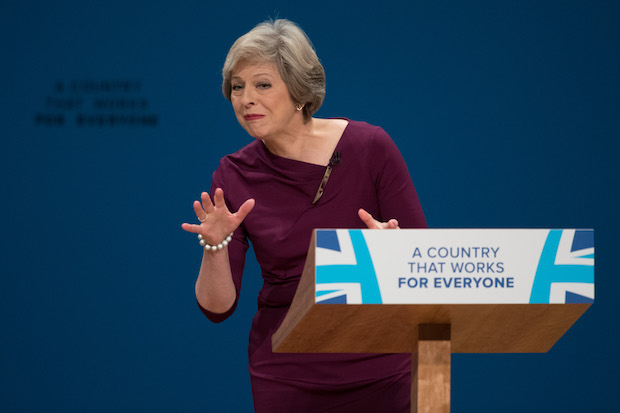The Conservative party conference in Birmingham this week seemed a remarkably relaxed affair. The European question has been settled. Seldom has victory in the next-election looked more secure. The Labour conference in Liverpool had been a debacle, as the hard left set about picking off the remaining moderates. Diane James has resigned as Ukip leader after 18 days. It’s quite possible that her replacement could transform Ukip into a new working-class party — and then do to Labour in the north of England what the SNP has done to it in Scotland.
One cabinet member put it well: the Tory party, he said, was like a piece of elastic that had been stretched much too far under David Cameron but has now been allowed to revert to a more natural position. Grammar schools, ideas about ‘shaming’ companies who employ foreigners — as if that were something to be ashamed of: such notions were banished during the David Cameron years, but now they’re back. And if voters find this off-putting, what are they going to do? Vote for Jeremy Corbyn?
A party that accused its former-leader of shuttling between panic and complacency is now in danger of doing the same. Take the Chancellor, Philip Hammond. He was remarkably keen to assert his dislike of over-borrowing. ‘Piling up debt for our children and our grandchildren to pay off is not only unsustainable,’ he said. ‘It’s unfair and it’s downright un-Conservative.’ Quite so. So why did he then go on to say he would not observe his predecessor’s target of balancing the books by the end of the current parliament? It is an abdication of fiscal responsibility dressed up as prudence.
The absence of proper opposition is bad for the Conservatives, many of whom are only in politics to keep the socialists out of power. Labour is now a danger only to itself. Under such circumstances, the Tories could grow lazy and quickly start to adopt bad ideas — or give up the hunt for new ones.
If the Conservatives were more dynamic, they might make good use of this period during which Theresa May is pretty much unopposed in the House of Commons. Mrs May could use this time rather as Margaret Thatcher used the years after the 1981 Labour party split: to enact bold reforms, push the boundaries of reforming Conservatism and change the political landscape. Instead we have a dash for selective education and some random snarling at companies thrown in.
There is already tension between those who argued for Brexit and those who disparaged it as regressive. The Brexiteers are keen to shape Britain’s departure from the EU as a liberal move that will allow the country to embrace the world. But some of those who argued for Remain seem determined to make Brexit conform to their caricature of mean-minded politics — a British nativism.
Amber Rudd, for example, is a shrewd politician who has the makings of a good Home Secretary. Yet she felt the need to talk as if she were throwing her hat into the ring for the Ukip leadership contest. Her line about ‘preventing migrants taking jobs that British people could do’ sounded odd coming from the mouth of a Conservative. Her proposal to force companies to reveal how many foreign workers they employed was bizarre, distasteful and alarming.
Mrs May said in her conference speech that ‘the Britain we’re going to build after Brexit is going to be a global Britain’. If so, why act as if the point of Brexit was to turn up the heat on Johnny Foreigner and start carping at companies who think globally when they recruit? It’s quite true that Britain has an immigration problem, one that Mrs May was not very successful in solving. But the solution lies in looking at work permits and reforming the tax and welfare system, or improving the incentives to work.
It would have been useful to have abolished the ridiculous and unachievable target of reducing net migration to the ‘tens of thousands’ and instead had a more mature conversation about the nature of immigration. At the Spectator conference fringe debate on Brexit, for example, the audience showed strong support for establishing a principle of free movement of workers between Britain, Australia and Canada.
Focusing on the nature rather than the amount of immigration makes far more sense — and now is the right time to take the politically difficult decision to drop a target that everyone knows cannot be met. New ideas are needed.
But this week’s Conservative conference was not a festival of ideas — nor did it need to be. All the Tories had to do to outperform the Labour party was to gather in one room and not start hurling abuse at each other. The first few weeks of Mrs May’s premiership should be seen as a leadership campaign fought after she entered No. 10, an overture to the party faithful.
Her proposal of a ‘country that works for everyone’ is laudable, but we did not learn much this week about how she plans to achieve it. Hopefully, in the next few months, we will start to find out.






Comments